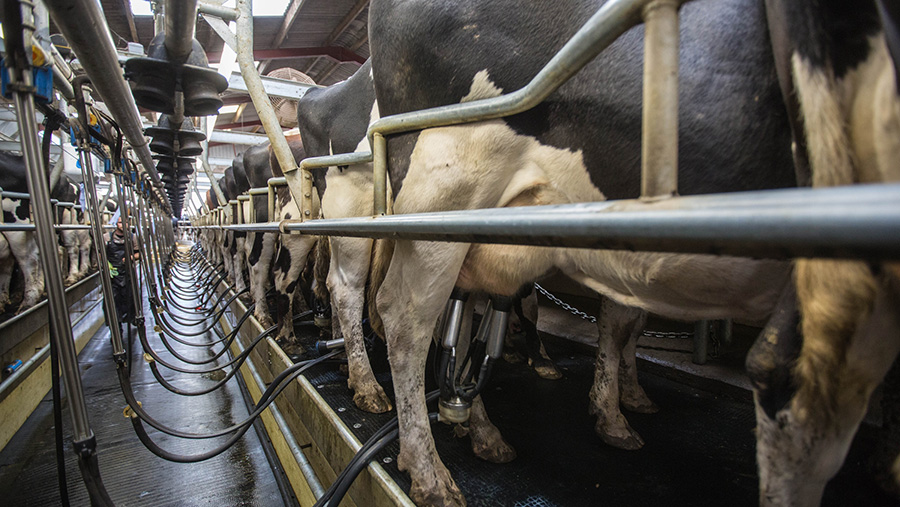Dairy farmer frustration grows over low milk prices
 © Tim Scrivener
© Tim Scrivener Dairy farmers are becoming increasingly disgruntled as milk processors continue to delay translating improved market returns into higher farmgate prices.
Price rises announced in recent days by Arla and First Milk have done little to allay complaints that many milk buyers are being too slow to pass back price rises.
On Monday (24 October), Arla announced a 1.49p/litre increase for November, taking its conventional price to 23.14p/litre.
See also: £200m skimmed off dairy farmers’ milk cheques, says NFU
It follows First Milk’s announcement last week that it will increase its A prices by a minimum of 1p/litre in November, taking them to 20.19-22.98p/litre.
Short-changed
Speaking at the Welsh Dairy Show, Aled Jones, NFU Cymru’s dairy board chairman, said market indicators suggested the milk price should be moving towards 25-30p/litre.
Defra’s average UK milk price was currently at 21.34p/litre and the average milk price in Wales was 1-2p/litre behind that, as so few farmers in the region had a retailer-aligned contract.
NFU Cymru therefore estimated the Welsh rural economy was being short-changed by about £220,000 a day.
“The latest AHDB market indicators show an actual milk price equivalent (AMPE) of 28.5p/litre and milk for cheese value equivalent (MCVE) of 32.4p/litre,” added Mr Jones.
“The latest Global Dairy Trade auction was up 1.9% and the spot milk price is now approaching 40p/litre – a huge disparity from [the] farmgate price.”
NFU Scotland policy manager George Jamieson said the sector was desperate for some stability and confidence.
“Dairy companies remain disappointingly slow to pass on higher market returns to farmers, which means that the crisis in the dairy sector in Scotland remains unprecedented in terms of the price pressure on farms.”
NFU dairy board chairman Michael Oakes said last month that the union had published a short report that showed £200m was missing in the UK dairy supply chain between April and September.
“Since then, commodity markets have strengthened further – butter prices are now at UK record levels, 108% higher than they were in April; cream prices are 144% higher at well over £1,900/tonne for October – yet we see little movement at farmgate.”
Sense of injustice
Dairy analyst Chris Walkland said farmgate prices were rising much more slowly than in the past. “There is a material sense of injustice from the non-aligned producers and some of them are really desperate and talking about breaking contract,” he warned.
“They know that the next downturn could be in three or four years and know they won’t have enough flesh on the bones to ride that out unless prices rise substantially, quickly.”
Mr Walkland added it was outrageous that some producers were also now being fined for failing to fulfil their A litres. “They are being fined for producing milk they couldn’t afford to produce. It is inexplicable.”
Non-aligned producers seek better deal
An anonymous Muller supplier claims to have had a good response to a campaign to improve the position of non-aligned producers.
The farmer is seeking to highlight the disparity between the price paid to aligned and non-aligned Muller suppliers, and to raise questions about their representation. The supplier argues that non-aligned producers have been left “unprotected and exposed” and the situation is unsustainable.
The campaign started with an advert calling for other non-aligned producers to contact them at mullernonaligned@gmail.com.
Lyndsay Chapman, agriculture director for Muller Milk & Ingredients, said the company had recently written to all Muller farmers, inviting them to meetings during November to discuss new proposals and information on issues including the Muller Milk Group’s representational structure, milk producer contracts and milk pricing, as well as the company’s ambitious plans in the UK.
“I’m sorry that this group of farmers hasn’t contacted me directly up to now, but hope they will in the near future or alternatively will attend these meetings to constructively provide their input. We are always happy to listen.”
